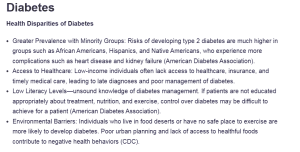Diabetes
Health Disparities of Diabetes
- Greater Prevalence with Minority Groups: Risks of developing type 2 diabetes are much higher in groups such as African Americans, Hispanics, and Native Americans, who experience more complications such as heart disease and kidney failure (American Diabetes Association).
- Access to Healthcare: Low-income individuals often lack access to healthcare, insurance, and timely medical care, leading to late diagnoses and poor management of diabetes.
- Low Literacy Levels—unsound knowledge of diabetes management. If patients are not educated appropriately about treatment, nutrition, and exercise, control over diabetes may be difficult to achieve for a patient (American Diabetes Association).
- Environmental Barriers: Individuals who live in food deserts or have no safe place to exercise are more likely to develop diabetes. Poor urban planning and lack of access to healthful foods contribute to negative health behaviors (CDC).
Advocacy Efforts for Diabetes
- American Diabetes Association (ADA): The ADA is an organization dedicated to creating awareness, raising funds for research, and advocating through policy changes that guarantee access to diabetes care, including affordable medications and treatments.
- National Diabetes Prevention Program (NDPP): NDPP incorporates the best available evidence for interventions to delay or prevent type 2 diabetes by making lifestyle changes that lead to weight reduction and physical activities (CDC).
- Community Health Initiatives: Agencies provide free screenings, education, and diabetes management support to underserved communities (AuYoung et al. 312- 317).
- Telehealth Programs: Virtual care and telemedicine have become increasingly important in providing remote monitoring and consultations, improving access to diabetes care (American Diabetes Association).
Call to Action
- Increase Awareness: A broader public health campaign is needed to educate communities about the importance of early detection and proper diabetes management.
- Enhance access to care: Policymakers have to guarantee equal access to health care, including affordable diabetes medicines, preventive care, and support services for underserved populations (Chisolm et al. 289- 299).
- Improve Health Literacy: More accessible education on diabetes prevention and management should be provided by schools, community centers, and healthcare providers.
- Focus on Prevention: Spend on preventive programs that focus on at-risk communities with a focus on lifestyle modification, such as better diets and exercise.
Conclusion
- Diabetes is a growing public health crisis that disproportionately affects vulnerable communities, making advocacy efforts critical.
- Collaboration among public health agencies, healthcare providers, and policymakers is necessary to get at the root causes of diabetes and lessen its toll.
- Empowering people with knowledge and tools for better diabetes management and prevention is vital.
- It requires an all-hands approach to completely wipe out health disparities and enhance the quality of life among people living with diabetes.
Works Cited
American Diabetes Association. “American Diabetes Association.” Diabetes.org, 2019, www.diabetes.org/.
AuYoung, Mona, et al. “The Diabetes Prevention Program for Underserved Populations: A Brief Review of Strategies in the Real World.” Diabetes Spectrum, vol. 32, no. 4, Nov. 2019, pp. 312–17, https://doi.org/10.2337/ds19-0007.
CDC. “Division of Diabetes Translation | CDC.” Www.cdc.gov, 10 Sept. 2020, www.cdc.gov/diabetes/.
Chisolm, Deena J., et al. “Improving Health Equity through Health Care Systems Research.” Health Services Research, vol. 58, no. S3, Wiley-Blackwell, Nov. 2023, pp. 289–99, https://doi.org/10.1111/1475-6773.14192.
ORDER A PLAGIARISM-FREE PAPER HERE
We’ll write everything from scratch
Question
Identify your chronic diseases and lifestyle (DIABETES)
Evaluate and research information relating to chronic diseases and lifestyle identified.

Diabetes
THESE ARE THE QUESTIONS THAT NEED ANSWERING AND USE BULLET POINT EXPLAINING EACH TOPICS. GIVE AT LEAST 4 BULLET POINTS FOR EACH QUESTION.
- -HEALTH DISPARITIES OF DIABETES
- -ADVOCACY EFFORTS FOR DIABETES (PROGRAMS AVAILABLE FOR DIABETES NOW)
- -WHAT IS CALL TO ACTION FOR THIS DISEASE. (DIABETES)
- -CONCLUSION (DIABETES)

